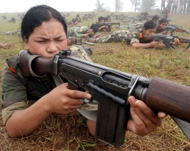In the Red hills of Nepal
As our battered Nissan drove higher into Nepal’s mountains I began to feel a sense of disquiet from our driver. I realised what was troubling him when the rear axle on our car hit a bump and fell off.

“This car is an old man … even old men need a rest!” he said in Hindi. I nodded and surveyed the area.
We were deep into Nepal’s Maoist heartland. Just in front of us a checkpoint with an arch draped with red hammer and sickle flags.
A picture, slightly faded, of an old man is pinned to the frame. In Nepal this old man hasn’t rested.
Chairman Mao is a leader whose philosophy of peasant revolution has captured the hearts and minds of many people in a country where 90 per cent of the population live on less than a dollar a day.
 |
|
The philosophy of peasant |
But what’s the attraction of Mao? Much of Nepal is poor and rural. From that simple fact the theories of Marx and Engels appealed to many of Nepal’s thinkers who saw parallels between their 19th-century thinking and Nepal today.
One of those men was Prachanda. According to local legend Prachanda – the “Fierce One” – grew up in a peasant family surrounded by deprivation. From childhood he lived in poverty. By the time he graduated from high school, he was a communist and political activist.
As our car was fixed we drove into a Maoist village high on a mountain plateau.
I have promised to keep the name of the village secret – being careful and suspicious seems to be a communist trait.
At first glance it feels much like any dirt-poor village in south Asia. Animals roam freely, children roam freer and men gather in groups and talk while women are barely glimpsed.
 |
|
Prachanda is seen as a visionary |
There is one crucial difference, however. Revolution is definitely in the air. Over a meal of rice and lentils a village leader, Comrade Surya, told me of Prachanda and the Maoists.
“Prachanda dedicated his life to helping others,” he said.
“In the ’90s Nepal was a mess, there were hundreds of self-serving political parties corrupt to the core and so Prachanda came to the hills and vowed to help the poor. He was truly a visionary.”
From the beginning, revolution was no easy undertaking. Prachanda had control of few men and they were ill-equipped and badly trained. They fought the Nepalese army but the skirmishes were ineffective and many of the casualties were poor Nepalese civilians caught in the crossfire.
There were, though, some successes gradually leading to more and more people joining the ranks of Prachanda’s Maoists.
The world paid little regard to them until November 23, 2001 – a landmark date for Nepal’s Maoists.
 |
|
Maoist forces have been added |
Then they launched 48 simultaneous attacks on the police and the army. The battles were fierce and the casualties high.
According to newspaper reports at the time, Maoist forces raided a number of government buildings and mounted massive assaults. This bloody conflict had the effect of making much of rural Nepal ungovernable.
Into this vacuum stepped Prachanda. He dismantled, through violence and coercion, the apparatus of the ruling class and replaced it with peasant revolution, adhering to the principles laid down by Mao.
It was a smart, if bloody and costly, move.
The world condemned Prachanda’s actions. The US added the Maoists to its list of terrorist groups while the conflict between the Maoists and the Royal Nepalese Government so far has cost 15,000 lives and made thousands more homeless.
But in this village all of that is history.
They defend the actions of the Maoists and vehemently disagree that the Maoists have committed human rights violations, a charge that groups such as Amnesty International have frequently levelled at them.
 |
|
Maoist-controlled villages have |
In this village they see a new hope for Nepal and for the future of the Party.
The village is a microcosm of the Maoists’ hopes and desires.
Here they are building roads and connecting villages. That is no mean feat high up in the mountains and without any heavy machinery.
One project I was shown had sent a huge boulder crashing into the valley below using people power alone. It was powerful metaphor for the revolution.
The village also has a social welfare system that takes to its heart Marx’s central tenet – from each according to ability, to each according to need.
That kind of collective living is replicated all over Nepal and has made the Maoists powerful and influential. As I left the village with its red hammer and sickle flags flying high I began to understand the appeal of Mao.
 |
|
The Maoists were prominent in |
It was summed up by a Nepalese journalist who told me: “In a country where the caste system and royal corruption for decades kept the majority of Nepal poor, Prachanda kept his message simple: Forget religion and the royal family. Mao will set you free and lift you up.
“That simple philosophy has turned revolution into politics and now as Nepal stands at a crossroads and the Maoists seem to be holding the map.”
But the map may still not be clear.
In the coming months the UN is set to arrive in Nepal at the request of the government and the Maoists to monitor arms control.
It forms part of a long round of negotiations after a pro-democracy movement forced the royal family to end direct rule, paving the way for elections slated for next year.
Elections which will decide the fate of the royal family and what part Prachanda and the ghosts of Mao, Marx and Engels will play in Nepal’s future.